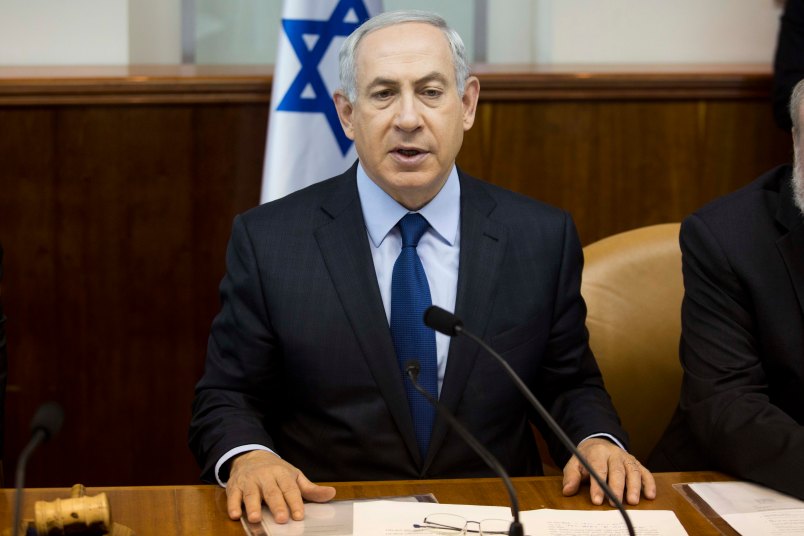WASHINGTON (AP) — President Barack Obama and Israeli Prime Minister Benjamin Netanyahu will seek to mend their fractured relationship when they meet at the White House Monday, the first time they have talked face to face in more than a year.
Tensions over the U.S.-backed nuclear deal with Iran continue to strain ties between the longtime allies. But there’s also little hope of progress on other matters, with U.S. officials downplaying the chance of a breakthrough in ongoing security talks and ruling out the prospect of a peace deal between Israelis and Palestinians before Obama leaves office in 14 months.
“The president has reached that conclusion that right now — barring a major shift — that the parties are not going to be in a position to negotiate a final status agreement,” White House Middle East adviser Rob Malley said ahead of Netanyahu’s arrival in Washington.
Monday’s meeting will also be clouded by the controversy following Netanyahu’s appointment of a new spokesman who has spoken derisively about Obama. Ran Baratz, a conservative commentator, has suggested in Facebook posts that Obama is anti-Semitic and Secretary of State John Kerry cannot be taken seriously.
Even with the low expectations, the fact that Obama and Netanyahu are meeting at all is seen as an important step. While the two leaders have long had a chilly relationship, tensions boiled over earlier this year amid Obama’s pursuit of the Iranian nuclear deal.
Netanyahu views Iran’s nuclear program as an existential threat to Israel and argued that the international agreement struck earlier this year leaves Tehran within reach of a bomb. The Israeli leader unsuccessfully lobbied U.S. lawmakers to oppose the deal, even delivering a rare speech to Congress that infuriated the White House.
Obama didn’t meet the prime minister when he traveled to Washington to address lawmakers, citing the proximity to Israeli elections that resulted in Netanyahu staying in power. The leaders also did not meet while Netanyahu was in the U.S. in September to speak to the United Nations General Assembly.
Officials in both governments have been discussing a new security agreement that could result in increased U.S. military assistance to Israel. U.S. officials said that while they did not expect Monday’s talks to result in a final agreement, it was significant that the leaders planned to discuss the matter given that Netanyahu had refused to do so in the immediate aftermath of the nuclear agreement.
“We do believe it’s very important that in an uncertain security environment, we are signaling our long-term commitment to Israel and its security, and are designing a package that is tailored to the threats and challenges that Israel will be facing over the course of the next decade,” said Ben Rhodes, Obama’s deputy national security adviser.
U.S. officials say Obama will also express his commitment to a two-state solution between Israel and Palestinians, even as the White House acknowledges that elusive breakthrough won’t occur before Obama leaves office in January 2017.
Jacob Dayan, a former Israeli diplomat who held multiple senior posts in the U.S., predicted a “very positive” meeting, saying both men had a strong interest in seeing it succeed. He said Obama is interested in establishing a positive legacy and “doesn’t want to be perceived as an anti-Israel president.” Netanyahu, meanwhile, wants to send a message that Israel’s relations with the U.S. are “as strong as ever.”
He said the men would seek common ground on the Palestinians, the Iran issue and the situation in Syria. Depending on how much progress they can make, he said, “the scale of the visit is between a good visit to a very good visit.” He also said the expected U.S. military aid package under discussion would go a big way toward smoothing over differences.
He said the uproar over Netanyahu’s new spokesman would likely not play a major factor in the talks. “There’s too much at stake from both men’s point of view,” he said.
Israeli Cabinet Minister Silvan Shalom, Netanyahu’s designated negotiator with the Palestinians, said in a radio interview that the prime minister would offer a number of confidence-building gestures toward the Palestinians, including easing restrictions on communications, water usage, work permits in Israel and Palestinian development in the West Bank.
While Obama’s predecessors have also been unable to bring the two parties together, the frankness of the White House’s admission was still striking.
Officials said Obama would instead press Netanyahu on what could be done to avoid confrontations between Israelis and Palestinians in the absence of a peace deal. A new wave of violence broke out about two months ago, beginning with unrest at a major Jerusalem shrine revered by both Muslims and Jews, and quickly spreading to Israel, the West Bank and the Gaza border.
Netanyahu said he would discuss “possible progress with the Palestinians, or at least stabilizing the situation with them.”
Israel has accused Palestinian political and religious leaders of inciting the violence. Palestinians say the violence is due to a lack of hope for gaining independence after years of failed peace efforts
___
AP writer Josef Federman in Jerusalem contributed to this report.
___
Follow Julie Pace at http://twitter.com/jpaceDC
Copyright 2015 The Associated Press. All rights reserved. This material may not be published, broadcast, rewritten or redistributed.







bqatever
BiBi is a lying scumbag… he has treated the United States with a tangible lack of respect.From our President and Government to my neighbor’s fucking ceramic Flamingoes… asshat neocon egg sucking bigot…